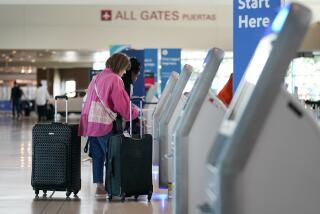Tougher Security, Safety Rules for Airlines Proposed
WASHINGTON — A White House commission recommended a potent mix of new aviation safety measures Wednesday, including stricter airport security, an updated air traffic control system, improved inspections of the nation’s commercial jetliner fleet--and several changes that could hit airline passengers in their wallets and lengthen the time they spend in airports.
The commission, formed after 230 people died when Trans World Airlines Flight 800 blew up after takeoff from New York last July, submitted 53 recommendations, including a controversial proposal to screen airport passengers to look for possible terrorists and to begin keeping better track of passenger luggage.
The changes would affect the traveling public in a myriad of ways, including a requirement that parents purchase a seat for all children, White House officials said. Until now, children under the age of 2 years could share an adult seat. The new system would require infants to travel in seats equipped with a child-restraint system.
The report, issued by the White House Commission on Aviation Safety and Security, essentially lays out a blueprint for a major overhaul of commercial aviation operations, aiming for a fivefold reduction in the rate of accidents over the next decade. The commission’s 20 members include defense technologists, federal law enforcement officials, intelligence experts and former military officials.
Although safety proposals are frequent products of Washington panels, the recommendations unveiled Wednesday would result in far-reaching and highly controversial changes in the U.S. transportation system.
Implementing the commission’s recommendations would require a combination of federal rule-making, administrative policy decisions and legislation, some of which has already taken place.
President Clinton endorsed the proposal and urged Congress to appropriate $100 million to implement some of the measures. Ultimately, the cost of the plan could total many billions of dollars, though administration officials said that almost all the recommendations could be implemented, at least in the short term, without substantial government spending.
The most controversial proposal calls for a much tougher national system for screening passengers for possible terrorists, hijackers and bombers.
Federal Aviation Administration spokesman Mark Hess said that the FAA currently requires airlines to monitor passengers. But the commission recommended a major new monitoring effort supported by the FBI, the CIA and the Bureau of Alcohol, Tobacco and Firearms.
“Based on information that is already in computer databases, passengers could be separated into a very large majority who present little or no risk and a small minority who merit additional attention,” the commission said. It apparently was referring to FBI and CIA records on criminals and suspected terrorists.
Although the commission outlined an eight-point plan for protecting privacy and civil liberties, the security measures drew quick criticism.
A coalition of 17 groups, including the American Civil Liberties Union and the American-Arab Anti-Discrimination Committee, said that profiling would result in discrimination against certain groups, particularly those of Middle Eastern origin.
“The risks to privacy are enormous,” the coalition wrote in a letter to the commission. “This proposal is a quick fix that won’t fix anything.”
A preliminary profiling system is being developed by the FAA and Northwest Airlines. Instead of focusing on the ethnic origin of passengers, the system will track specific kinds of behavior, said Elaine Kamarck, a senior policy advisor to Vice President Al Gore, who headed the commission. For security reasons, the government is not saying anything more about the profiling system, she added.
A less controversial proposal concerns passenger luggage. When bags are transferred to another airplane for a connecting flight, airlines should be able to match the bags with passengers and ensure that the passengers also get on the second flight, Kamarck said.
But since such a system could cause long delays at hub airports, the commission opted for an “interim position” of randomly checking that both passengers--who would be identified through a new profiling system--and their bags make connecting flights.
If passengers are not shown to have boarded the second plane, their luggage would be taken off the aircraft.
Eventually, technology will enable airlines to do bag matches for all passengers, Kamarck said.
The report also urges the FAA to update air traffic control, converting to a satellite-based system for separating jetliners.
It suggests that the FAA remodel its regulatory programs and its certification systems to meet the rapid changes in the deregulated airline industry.
While commercial flying is safer than ever, a future crisis is looming, the report warns. Without vast improvements in safety, airliner accidents around the world will become weekly events as air travel increases in the future, the report predicts.
(BEGIN TEXT OF INFOBOX / INFOGRAPHIC)
Guarding the Skies
Among the 53 recommendations developed by the panel headed by Vice President Al Gore:
* Technology: Spend $100 million a year to modernize air traffic control systems
* Bomb detection: Improve bomb-detecting technology and increase use of bomb-sniffing dogs.
* Terrorism: Develop profiles of suspected terrorists.
* Cargo: Screen bags to be sure they do not match up with anyone listed in the terrorist profiles.
* Mail: Allow Postal Service to randomly screen packages weighing over a pound for explosive devices.
Source: Times staff and wire reports
More to Read
Sign up for Essential California
The most important California stories and recommendations in your inbox every morning.
You may occasionally receive promotional content from the Los Angeles Times.











